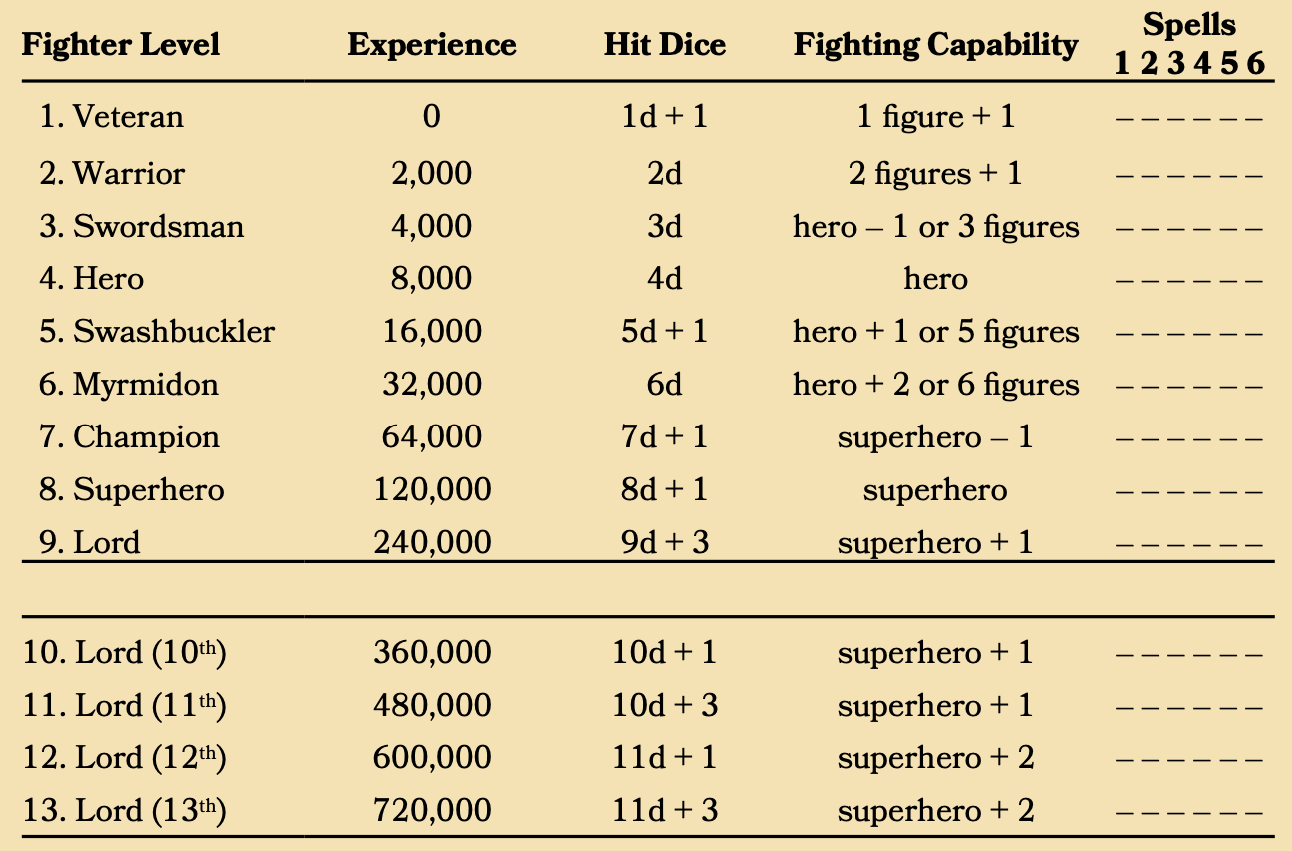Proclaim Your Titles
To advance to the next level, you must achieve something your peers would consider worthy, and then proclaim your new title.

I will preface by acknowledging, as Zedeck Siew has nicely articulated, that there are problems with incentivising "ethical" behaviour, and as Luke argued in one of his polemics, don't incentivise "desired" behaviour.
Yet, I have been ruminating on a post by Fae Errant about gender-coded aspirations & incentives in roleplaying games. Although "XP-for-GP" is an OSR shibboleth, some interesting alternatives have been presented, including Luke Gearing's Wolves Upon the Coast campaign and its advancement by boasting.
A once iconic but now near-forgotten element of That '70s Dragon Game was the level title. Although some were decidedly low-effort (the Barbarian was simply called such at every level), the rest implied a modicum of world-building and helped to provide a lexicon for relating the game abstraction of levels to in-world character scale. For the uninitiated, Grognardia has a nice summary of Fighter and Thief level titles.
It strikes me (both in the reading and the playing) that despite these level tiles being compelling, they are also awkward to fully operationalise. Upon hauling the latest cart of ransacked grave goods back to town, your holier-than-thou Cleric suddenly advances to the third level, and is automatically ordained as a Priest? Though out of vogue in many circles, training time and costs might ameliorate this somewhat, but don't strike at the heart of the matter. Level titles feel disconnected from the usual systems of advancement - but can we flip the script on that?
An aside on incentives
My experience playing games this year with minimal extrinsic mechanical incentive (in contrast to the intrinsic incentives generated by players' actor or pawn stances) has been largely positive. Some games have minimal advancement (Cairn by Yochai Gal), others provided a drip feed of advancement mostly just for showing up (Wildsea by Felix Isaacs, Vaesen by Free League, and Neon City Overdrive by Nathan Russell). None particularly left my table for want of further incentives.
However, I would argue that extrinsic incentives such as advancement remain a vital tool to shape play. In assuming a lusory attitude we adopt the necessary conceits and constraints that inform our play: I've sadly sat down to play a board game with my friends, failed to adopt the lusory attitude, and as should be expected we all had a worse time for it. For many players of imagination games, a clear 'goal' against which to struggle is a vital anchor in an otherwise tumultuous sea of possibilities. If restrictions breed creativity, then unbridled freedom breeds only banality.
Taking a more descriptive than prescriptive look at gaming, one of the most enduring legacies of hoary-old Dungeons & Dragons is precisely its codification of a class-and-level system of character creation & advancement, and the now classic trinities (Warrior, Thief, Mage and DPS, Tank, Healer) carved from the earliest four classes (Fighter-man, Cleric, Magic-user, Thief). Computer games are fecund with such inspired systems, and inarguably they are engaging in the sense they hold player engagement. A reasonable position to hold would even be that this is one of the cardinal reasons that Dungeons & Dragons took off and endured, despite early competition by games like Traveller and RuneQuest/Call of Cthulhu, that presented a far more restrained progression system.
The actual proposal, finally
Scrap XP.
At character creation, claim your name and first title; some suitable construction like:
- Guy of Gisborne
- Gimli, son of Glóin
- Aragorn, Ranger of the North
- Bjorn the Fell-Handed
To advance to the next level, you must achieve something your peers would consider worthy, and then proclaim your new title. A feast, party or other ceremony is warranted and if you still like giving and taking GP for advancement, you can say the festivities must cost the same amount it would have taken to level up per your favourite elf-game. Example adventurer-tier titles might be:
- Goblin-slayer, for beheading the chief of a local hive that were preying upon your home town
- Elf-friend, for a non-Elf who rallied to their aid in a time of dire need
- Priest of Homlet, for one you have actually done the fictional legwork to be ordained by the church
Your new claim will be judged by your peers: both in-world by the characters, but also at-the-table by the GM and the other players. Unmeritorious claims found wanting should be rebuked: there is little more embarrassing than a failed attempt to re-title yourself, and this risk of admonishment (and perhaps wasted expenses on the celebration!) should be sufficient disincentive to make frivolous title claims.
Tiers & responsibilities
There is no uniformly agreed set of level-and-tier distinctions in the litany of "F20" games, but I'll equate the now most well known (D&D 5E) and roughly equate it to other sources:
- Levels 1-4 are Local Heroes (5E), akin to Basic (dungeon-based)
- Levels 5-10 are Heroes of the realm (5E), akin to Expert (wilderness-based)
- Levels 11-16 are Masters of the Realm (5E), akin to Companion (domain-based)
- Levels 17-20 are Masters of the World (5E), akin to Master & Immortal (planar-based)
The notion is that you must claim a title worthy of the station you hold: a level 5 Fighter who tries to advance to level 6 by proclaiming "Ravager of the Borderlands" for clearing the Caves of Chaos has missed their chance, and should be suitably shamed for trying to pick such low-hanging fruit.
Circling back to that inciting post by Fae Errant, I think it's important to highlight that claiming a title doesn't just give you power and authority: it also entails duty and obligation. Consider the medieval system of sworn fealty: there is a bi-directional relationship between ruler and the ruled, where though asymmetric, both sides are indebted to the other in some sense and must uphold their end of the arrangement.
I would say only your first-level title is uncontested and leaves you obligated to only yourself.
All later titles should entail some oath or debt of honour, a pledge to serve and protect, etc. The goblin-slayer will be called upon to drive off the next roving goblin horde, the elf-friend will be drawn into a heated dispute between their nations, and the priest of Homlet will have to lead an expedition to exorcise the town's purportedly haunted moathouse.
This rather elegantly supports player-driven play: admixing the pull of seeking new deeds worthy of proclamation with the push to to defend your existing titles against usurpers or calls for aid. The process naturally weaves your character into the broader fabric of the setting: no man is an island.
Failure to uphold your duty also has a natural means of recourse: loss of the level & title. Enfeebled by your disgrace, the ways of the world are that the Old and New Gods or some other Divine Authority that has invested you with this power can just as easily take it away when it is no longer earned.
To twist the otherwise spent quote by Voltaire: with great responsibility comes great power.




